Business Ethics Report: Volkswagen's Ethical Issues and Stakeholders
VerifiedAdded on 2020/07/23
|13
|4200
|69
Report
AI Summary
This report delves into the realm of business ethics, using Volkswagen as a case study. It begins by exploring the development of ethical theories like duty-based, utilitarian, and teleological ethics, contrasting absolute and relative ethical approaches. The report identifies key ethical issues affecting business activities, such as equal opportunity, employment law, diversity, and employment standards, with a specific focus on their impact on Volkswagen. It then examines how ethical considerations influence business objectives like productivity, profitability, customer satisfaction, employee retention, and future growth. The report also analyzes the implications for businesses and their stakeholders when working ethically, including employees, shareholders, government, customers, and competitors. Furthermore, it highlights the role of Jaguar as a moral agent and suggests mechanisms for achieving employee involvement and enlargement. The report concludes by discussing ethical issues affecting Jaguar, proposing strategies to improve organizational ethics and the creation of an ethical code.
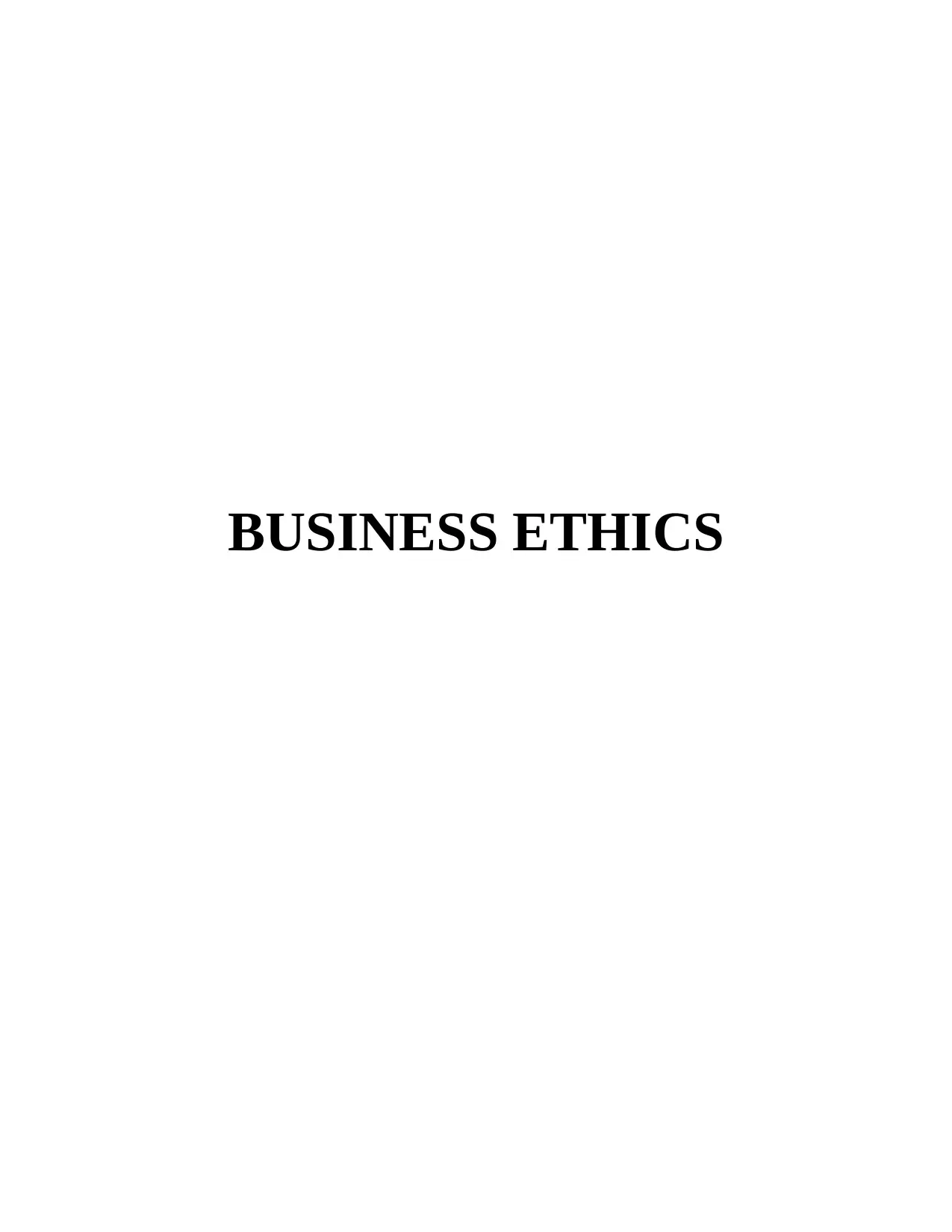
BUSINESS ETHICS
Paraphrase This Document
Need a fresh take? Get an instant paraphrase of this document with our AI Paraphraser
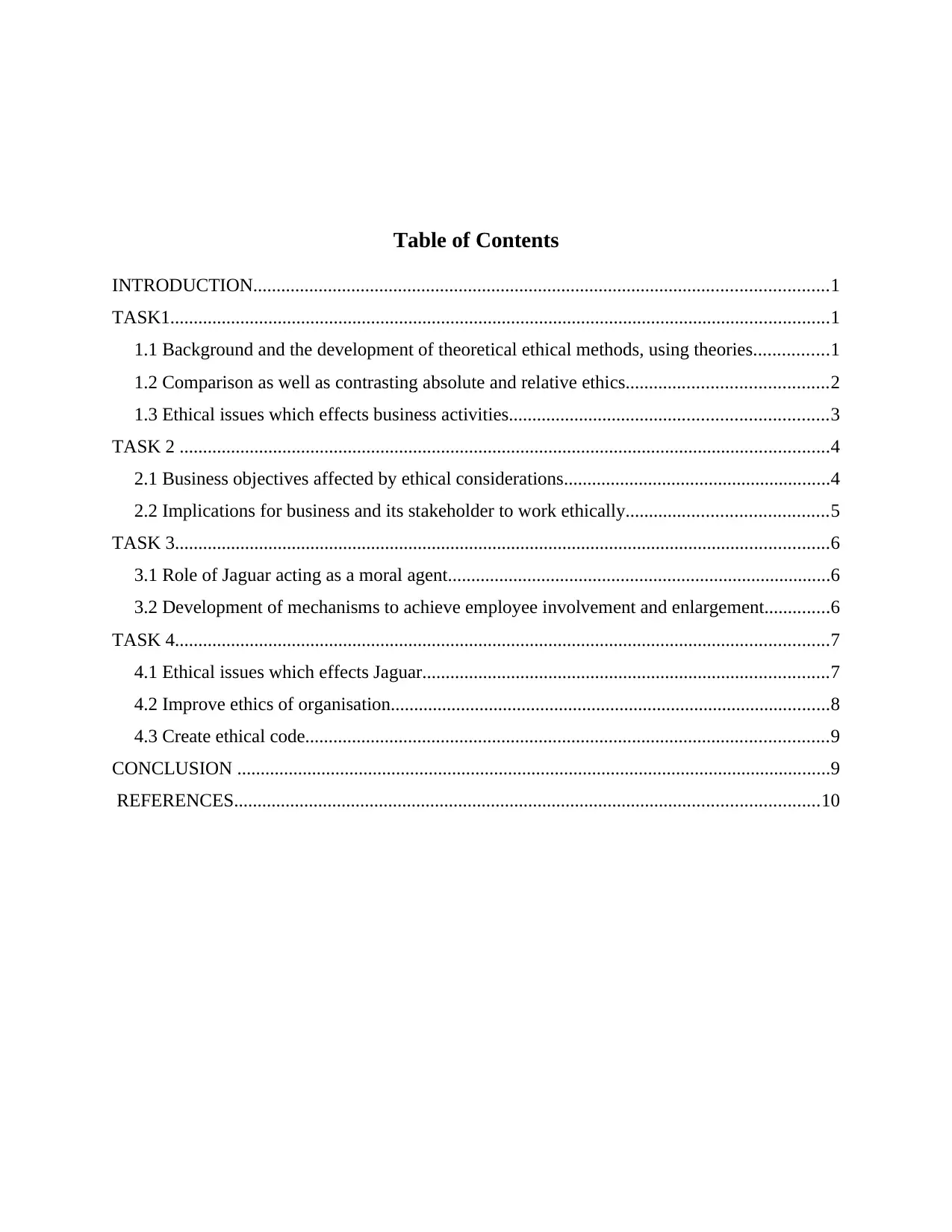
Table of Contents
INTRODUCTION...........................................................................................................................1
TASK1.............................................................................................................................................1
1.1 Background and the development of theoretical ethical methods, using theories................1
1.2 Comparison as well as contrasting absolute and relative ethics...........................................2
1.3 Ethical issues which effects business activities....................................................................3
TASK 2 ...........................................................................................................................................4
2.1 Business objectives affected by ethical considerations.........................................................4
2.2 Implications for business and its stakeholder to work ethically...........................................5
TASK 3............................................................................................................................................6
3.1 Role of Jaguar acting as a moral agent..................................................................................6
3.2 Development of mechanisms to achieve employee involvement and enlargement..............6
TASK 4............................................................................................................................................7
4.1 Ethical issues which effects Jaguar.......................................................................................7
4.2 Improve ethics of organisation..............................................................................................8
4.3 Create ethical code................................................................................................................9
CONCLUSION ...............................................................................................................................9
REFERENCES.............................................................................................................................10
INTRODUCTION...........................................................................................................................1
TASK1.............................................................................................................................................1
1.1 Background and the development of theoretical ethical methods, using theories................1
1.2 Comparison as well as contrasting absolute and relative ethics...........................................2
1.3 Ethical issues which effects business activities....................................................................3
TASK 2 ...........................................................................................................................................4
2.1 Business objectives affected by ethical considerations.........................................................4
2.2 Implications for business and its stakeholder to work ethically...........................................5
TASK 3............................................................................................................................................6
3.1 Role of Jaguar acting as a moral agent..................................................................................6
3.2 Development of mechanisms to achieve employee involvement and enlargement..............6
TASK 4............................................................................................................................................7
4.1 Ethical issues which effects Jaguar.......................................................................................7
4.2 Improve ethics of organisation..............................................................................................8
4.3 Create ethical code................................................................................................................9
CONCLUSION ...............................................................................................................................9
REFERENCES.............................................................................................................................10
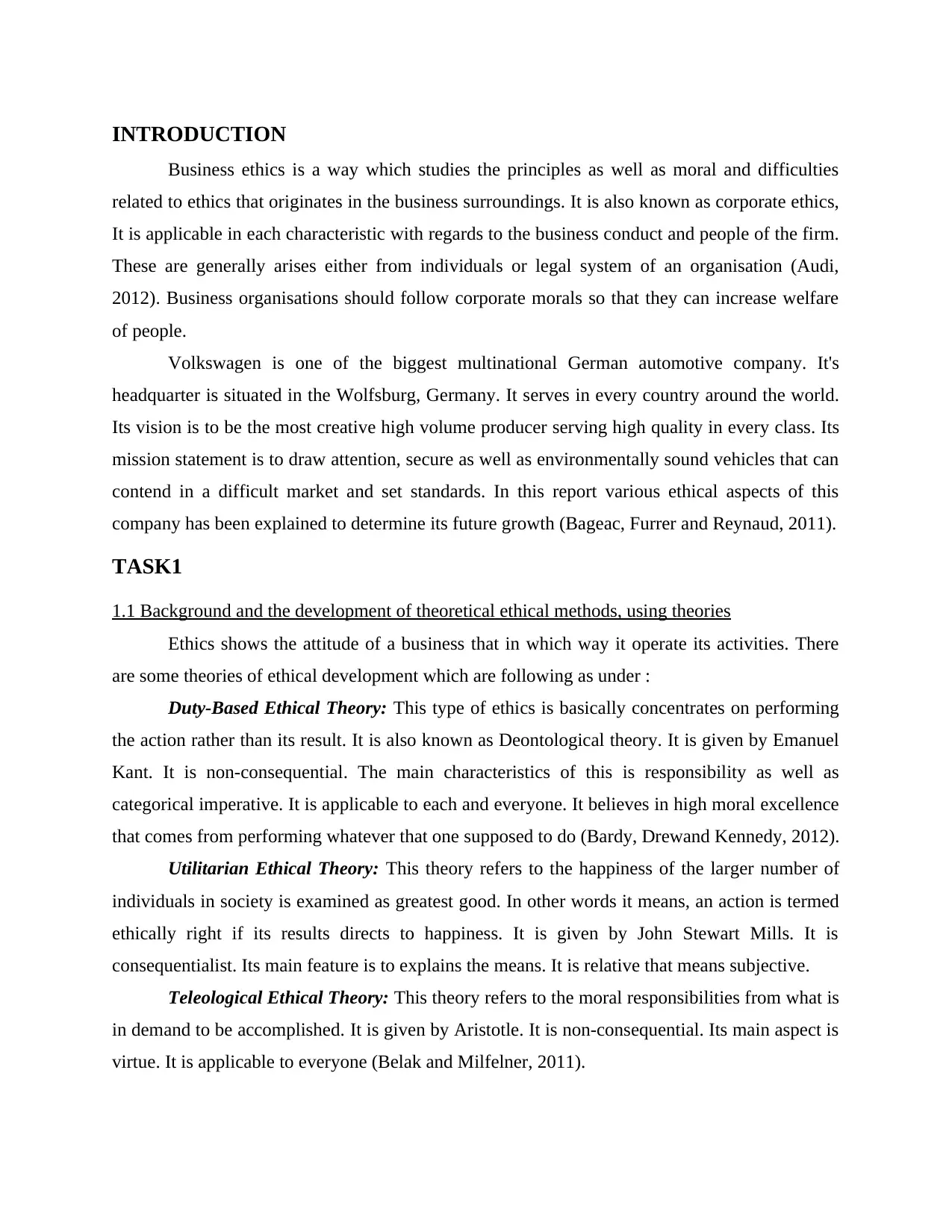
INTRODUCTION
Business ethics is a way which studies the principles as well as moral and difficulties
related to ethics that originates in the business surroundings. It is also known as corporate ethics,
It is applicable in each characteristic with regards to the business conduct and people of the firm.
These are generally arises either from individuals or legal system of an organisation (Audi,
2012). Business organisations should follow corporate morals so that they can increase welfare
of people.
Volkswagen is one of the biggest multinational German automotive company. It's
headquarter is situated in the Wolfsburg, Germany. It serves in every country around the world.
Its vision is to be the most creative high volume producer serving high quality in every class. Its
mission statement is to draw attention, secure as well as environmentally sound vehicles that can
contend in a difficult market and set standards. In this report various ethical aspects of this
company has been explained to determine its future growth (Bageac, Furrer and Reynaud, 2011).
TASK1
1.1 Background and the development of theoretical ethical methods, using theories
Ethics shows the attitude of a business that in which way it operate its activities. There
are some theories of ethical development which are following as under :
Duty-Based Ethical Theory: This type of ethics is basically concentrates on performing
the action rather than its result. It is also known as Deontological theory. It is given by Emanuel
Kant. It is non-consequential. The main characteristics of this is responsibility as well as
categorical imperative. It is applicable to each and everyone. It believes in high moral excellence
that comes from performing whatever that one supposed to do (Bardy, Drewand Kennedy, 2012).
Utilitarian Ethical Theory: This theory refers to the happiness of the larger number of
individuals in society is examined as greatest good. In other words it means, an action is termed
ethically right if its results directs to happiness. It is given by John Stewart Mills. It is
consequentialist. Its main feature is to explains the means. It is relative that means subjective.
Teleological Ethical Theory: This theory refers to the moral responsibilities from what is
in demand to be accomplished. It is given by Aristotle. It is non-consequential. Its main aspect is
virtue. It is applicable to everyone (Belak and Milfelner, 2011).
Business ethics is a way which studies the principles as well as moral and difficulties
related to ethics that originates in the business surroundings. It is also known as corporate ethics,
It is applicable in each characteristic with regards to the business conduct and people of the firm.
These are generally arises either from individuals or legal system of an organisation (Audi,
2012). Business organisations should follow corporate morals so that they can increase welfare
of people.
Volkswagen is one of the biggest multinational German automotive company. It's
headquarter is situated in the Wolfsburg, Germany. It serves in every country around the world.
Its vision is to be the most creative high volume producer serving high quality in every class. Its
mission statement is to draw attention, secure as well as environmentally sound vehicles that can
contend in a difficult market and set standards. In this report various ethical aspects of this
company has been explained to determine its future growth (Bageac, Furrer and Reynaud, 2011).
TASK1
1.1 Background and the development of theoretical ethical methods, using theories
Ethics shows the attitude of a business that in which way it operate its activities. There
are some theories of ethical development which are following as under :
Duty-Based Ethical Theory: This type of ethics is basically concentrates on performing
the action rather than its result. It is also known as Deontological theory. It is given by Emanuel
Kant. It is non-consequential. The main characteristics of this is responsibility as well as
categorical imperative. It is applicable to each and everyone. It believes in high moral excellence
that comes from performing whatever that one supposed to do (Bardy, Drewand Kennedy, 2012).
Utilitarian Ethical Theory: This theory refers to the happiness of the larger number of
individuals in society is examined as greatest good. In other words it means, an action is termed
ethically right if its results directs to happiness. It is given by John Stewart Mills. It is
consequentialist. Its main feature is to explains the means. It is relative that means subjective.
Teleological Ethical Theory: This theory refers to the moral responsibilities from what is
in demand to be accomplished. It is given by Aristotle. It is non-consequential. Its main aspect is
virtue. It is applicable to everyone (Belak and Milfelner, 2011).
⊘ This is a preview!⊘
Do you want full access?
Subscribe today to unlock all pages.

Trusted by 1+ million students worldwide
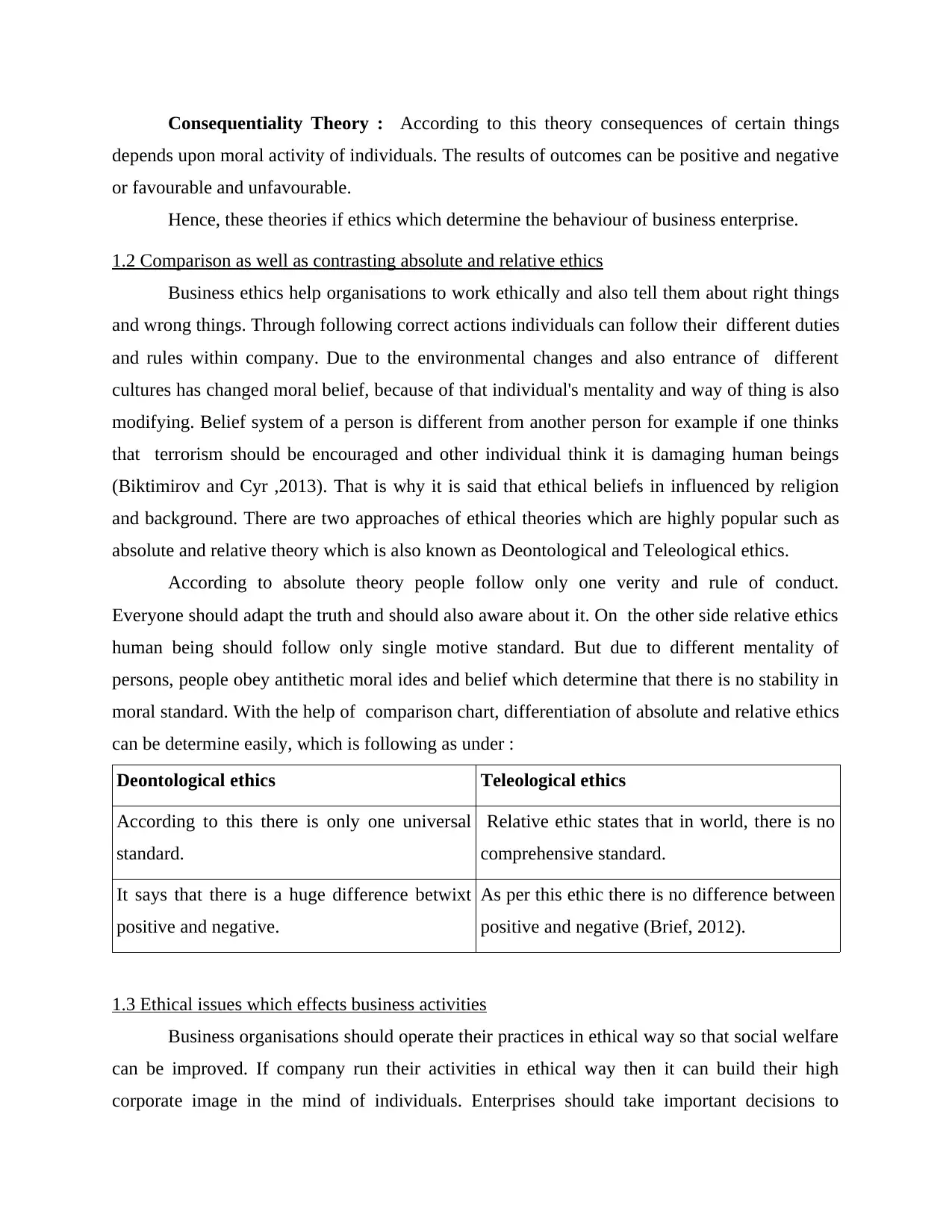
Consequentiality Theory : According to this theory consequences of certain things
depends upon moral activity of individuals. The results of outcomes can be positive and negative
or favourable and unfavourable.
Hence, these theories if ethics which determine the behaviour of business enterprise.
1.2 Comparison as well as contrasting absolute and relative ethics
Business ethics help organisations to work ethically and also tell them about right things
and wrong things. Through following correct actions individuals can follow their different duties
and rules within company. Due to the environmental changes and also entrance of different
cultures has changed moral belief, because of that individual's mentality and way of thing is also
modifying. Belief system of a person is different from another person for example if one thinks
that terrorism should be encouraged and other individual think it is damaging human beings
(Biktimirov and Cyr ,2013). That is why it is said that ethical beliefs in influenced by religion
and background. There are two approaches of ethical theories which are highly popular such as
absolute and relative theory which is also known as Deontological and Teleological ethics.
According to absolute theory people follow only one verity and rule of conduct.
Everyone should adapt the truth and should also aware about it. On the other side relative ethics
human being should follow only single motive standard. But due to different mentality of
persons, people obey antithetic moral ides and belief which determine that there is no stability in
moral standard. With the help of comparison chart, differentiation of absolute and relative ethics
can be determine easily, which is following as under :
Deontological ethics Teleological ethics
According to this there is only one universal
standard.
Relative ethic states that in world, there is no
comprehensive standard.
It says that there is a huge difference betwixt
positive and negative.
As per this ethic there is no difference between
positive and negative (Brief, 2012).
1.3 Ethical issues which effects business activities
Business organisations should operate their practices in ethical way so that social welfare
can be improved. If company run their activities in ethical way then it can build their high
corporate image in the mind of individuals. Enterprises should take important decisions to
depends upon moral activity of individuals. The results of outcomes can be positive and negative
or favourable and unfavourable.
Hence, these theories if ethics which determine the behaviour of business enterprise.
1.2 Comparison as well as contrasting absolute and relative ethics
Business ethics help organisations to work ethically and also tell them about right things
and wrong things. Through following correct actions individuals can follow their different duties
and rules within company. Due to the environmental changes and also entrance of different
cultures has changed moral belief, because of that individual's mentality and way of thing is also
modifying. Belief system of a person is different from another person for example if one thinks
that terrorism should be encouraged and other individual think it is damaging human beings
(Biktimirov and Cyr ,2013). That is why it is said that ethical beliefs in influenced by religion
and background. There are two approaches of ethical theories which are highly popular such as
absolute and relative theory which is also known as Deontological and Teleological ethics.
According to absolute theory people follow only one verity and rule of conduct.
Everyone should adapt the truth and should also aware about it. On the other side relative ethics
human being should follow only single motive standard. But due to different mentality of
persons, people obey antithetic moral ides and belief which determine that there is no stability in
moral standard. With the help of comparison chart, differentiation of absolute and relative ethics
can be determine easily, which is following as under :
Deontological ethics Teleological ethics
According to this there is only one universal
standard.
Relative ethic states that in world, there is no
comprehensive standard.
It says that there is a huge difference betwixt
positive and negative.
As per this ethic there is no difference between
positive and negative (Brief, 2012).
1.3 Ethical issues which effects business activities
Business organisations should operate their practices in ethical way so that social welfare
can be improved. If company run their activities in ethical way then it can build their high
corporate image in the mind of individuals. Enterprises should take important decisions to
Paraphrase This Document
Need a fresh take? Get an instant paraphrase of this document with our AI Paraphraser
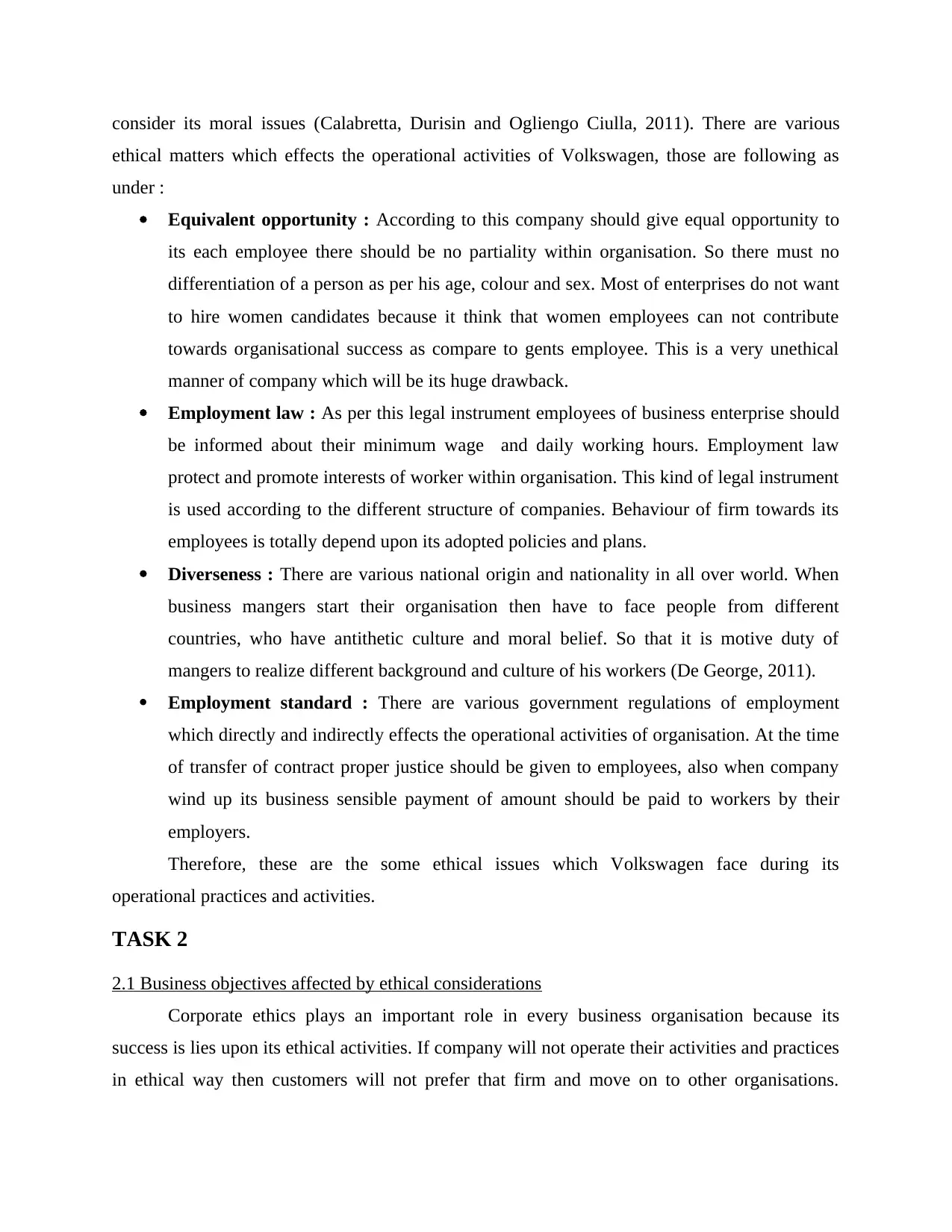
consider its moral issues (Calabretta, Durisin and Ogliengo Ciulla, 2011). There are various
ethical matters which effects the operational activities of Volkswagen, those are following as
under :
Equivalent opportunity : According to this company should give equal opportunity to
its each employee there should be no partiality within organisation. So there must no
differentiation of a person as per his age, colour and sex. Most of enterprises do not want
to hire women candidates because it think that women employees can not contribute
towards organisational success as compare to gents employee. This is a very unethical
manner of company which will be its huge drawback.
Employment law : As per this legal instrument employees of business enterprise should
be informed about their minimum wage and daily working hours. Employment law
protect and promote interests of worker within organisation. This kind of legal instrument
is used according to the different structure of companies. Behaviour of firm towards its
employees is totally depend upon its adopted policies and plans.
Diverseness : There are various national origin and nationality in all over world. When
business mangers start their organisation then have to face people from different
countries, who have antithetic culture and moral belief. So that it is motive duty of
mangers to realize different background and culture of his workers (De George, 2011).
Employment standard : There are various government regulations of employment
which directly and indirectly effects the operational activities of organisation. At the time
of transfer of contract proper justice should be given to employees, also when company
wind up its business sensible payment of amount should be paid to workers by their
employers.
Therefore, these are the some ethical issues which Volkswagen face during its
operational practices and activities.
TASK 2
2.1 Business objectives affected by ethical considerations
Corporate ethics plays an important role in every business organisation because its
success is lies upon its ethical activities. If company will not operate their activities and practices
in ethical way then customers will not prefer that firm and move on to other organisations.
ethical matters which effects the operational activities of Volkswagen, those are following as
under :
Equivalent opportunity : According to this company should give equal opportunity to
its each employee there should be no partiality within organisation. So there must no
differentiation of a person as per his age, colour and sex. Most of enterprises do not want
to hire women candidates because it think that women employees can not contribute
towards organisational success as compare to gents employee. This is a very unethical
manner of company which will be its huge drawback.
Employment law : As per this legal instrument employees of business enterprise should
be informed about their minimum wage and daily working hours. Employment law
protect and promote interests of worker within organisation. This kind of legal instrument
is used according to the different structure of companies. Behaviour of firm towards its
employees is totally depend upon its adopted policies and plans.
Diverseness : There are various national origin and nationality in all over world. When
business mangers start their organisation then have to face people from different
countries, who have antithetic culture and moral belief. So that it is motive duty of
mangers to realize different background and culture of his workers (De George, 2011).
Employment standard : There are various government regulations of employment
which directly and indirectly effects the operational activities of organisation. At the time
of transfer of contract proper justice should be given to employees, also when company
wind up its business sensible payment of amount should be paid to workers by their
employers.
Therefore, these are the some ethical issues which Volkswagen face during its
operational practices and activities.
TASK 2
2.1 Business objectives affected by ethical considerations
Corporate ethics plays an important role in every business organisation because its
success is lies upon its ethical activities. If company will not operate their activities and practices
in ethical way then customers will not prefer that firm and move on to other organisations.
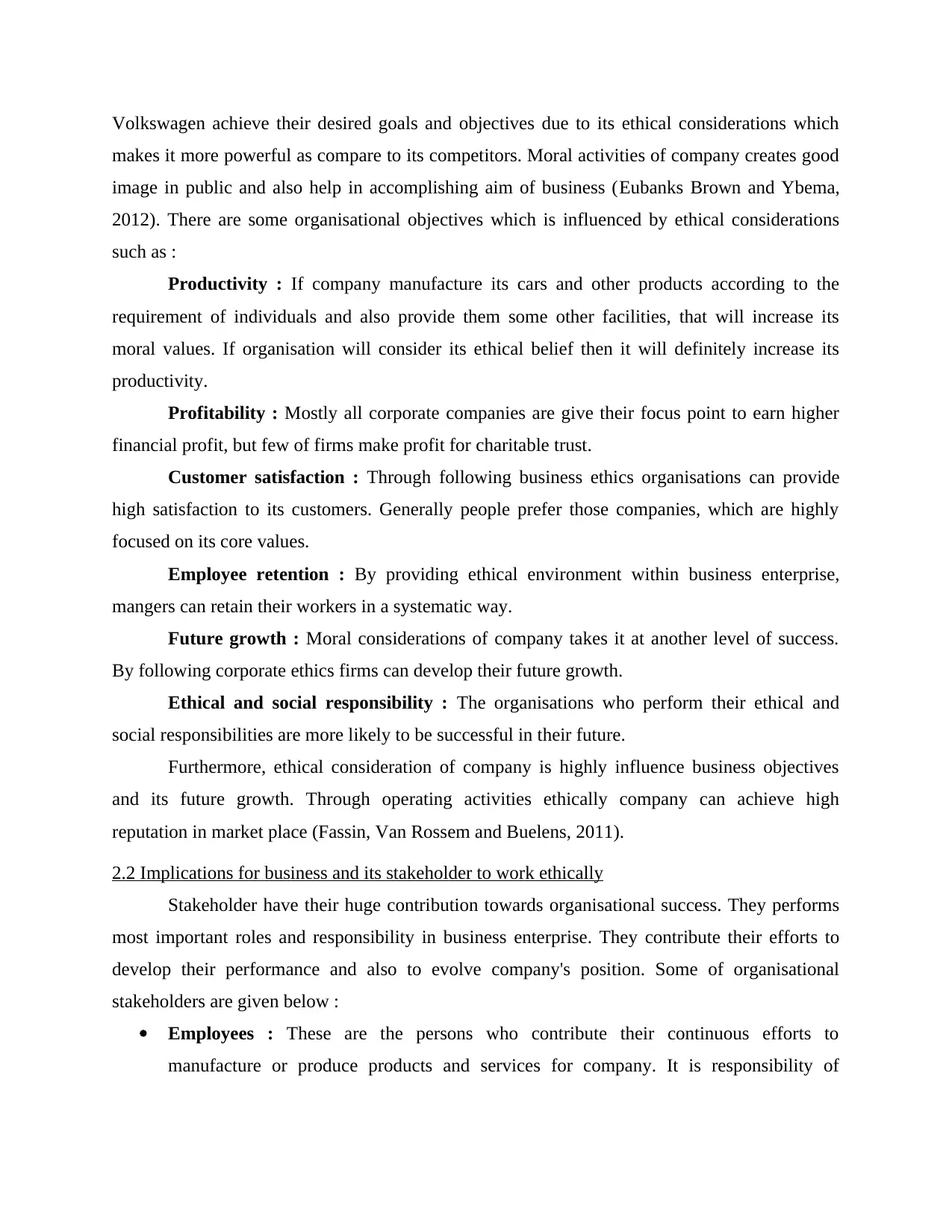
Volkswagen achieve their desired goals and objectives due to its ethical considerations which
makes it more powerful as compare to its competitors. Moral activities of company creates good
image in public and also help in accomplishing aim of business (Eubanks Brown and Ybema,
2012). There are some organisational objectives which is influenced by ethical considerations
such as :
Productivity : If company manufacture its cars and other products according to the
requirement of individuals and also provide them some other facilities, that will increase its
moral values. If organisation will consider its ethical belief then it will definitely increase its
productivity.
Profitability : Mostly all corporate companies are give their focus point to earn higher
financial profit, but few of firms make profit for charitable trust.
Customer satisfaction : Through following business ethics organisations can provide
high satisfaction to its customers. Generally people prefer those companies, which are highly
focused on its core values.
Employee retention : By providing ethical environment within business enterprise,
mangers can retain their workers in a systematic way.
Future growth : Moral considerations of company takes it at another level of success.
By following corporate ethics firms can develop their future growth.
Ethical and social responsibility : The organisations who perform their ethical and
social responsibilities are more likely to be successful in their future.
Furthermore, ethical consideration of company is highly influence business objectives
and its future growth. Through operating activities ethically company can achieve high
reputation in market place (Fassin, Van Rossem and Buelens, 2011).
2.2 Implications for business and its stakeholder to work ethically
Stakeholder have their huge contribution towards organisational success. They performs
most important roles and responsibility in business enterprise. They contribute their efforts to
develop their performance and also to evolve company's position. Some of organisational
stakeholders are given below :
Employees : These are the persons who contribute their continuous efforts to
manufacture or produce products and services for company. It is responsibility of
makes it more powerful as compare to its competitors. Moral activities of company creates good
image in public and also help in accomplishing aim of business (Eubanks Brown and Ybema,
2012). There are some organisational objectives which is influenced by ethical considerations
such as :
Productivity : If company manufacture its cars and other products according to the
requirement of individuals and also provide them some other facilities, that will increase its
moral values. If organisation will consider its ethical belief then it will definitely increase its
productivity.
Profitability : Mostly all corporate companies are give their focus point to earn higher
financial profit, but few of firms make profit for charitable trust.
Customer satisfaction : Through following business ethics organisations can provide
high satisfaction to its customers. Generally people prefer those companies, which are highly
focused on its core values.
Employee retention : By providing ethical environment within business enterprise,
mangers can retain their workers in a systematic way.
Future growth : Moral considerations of company takes it at another level of success.
By following corporate ethics firms can develop their future growth.
Ethical and social responsibility : The organisations who perform their ethical and
social responsibilities are more likely to be successful in their future.
Furthermore, ethical consideration of company is highly influence business objectives
and its future growth. Through operating activities ethically company can achieve high
reputation in market place (Fassin, Van Rossem and Buelens, 2011).
2.2 Implications for business and its stakeholder to work ethically
Stakeholder have their huge contribution towards organisational success. They performs
most important roles and responsibility in business enterprise. They contribute their efforts to
develop their performance and also to evolve company's position. Some of organisational
stakeholders are given below :
Employees : These are the persons who contribute their continuous efforts to
manufacture or produce products and services for company. It is responsibility of
⊘ This is a preview!⊘
Do you want full access?
Subscribe today to unlock all pages.

Trusted by 1+ million students worldwide
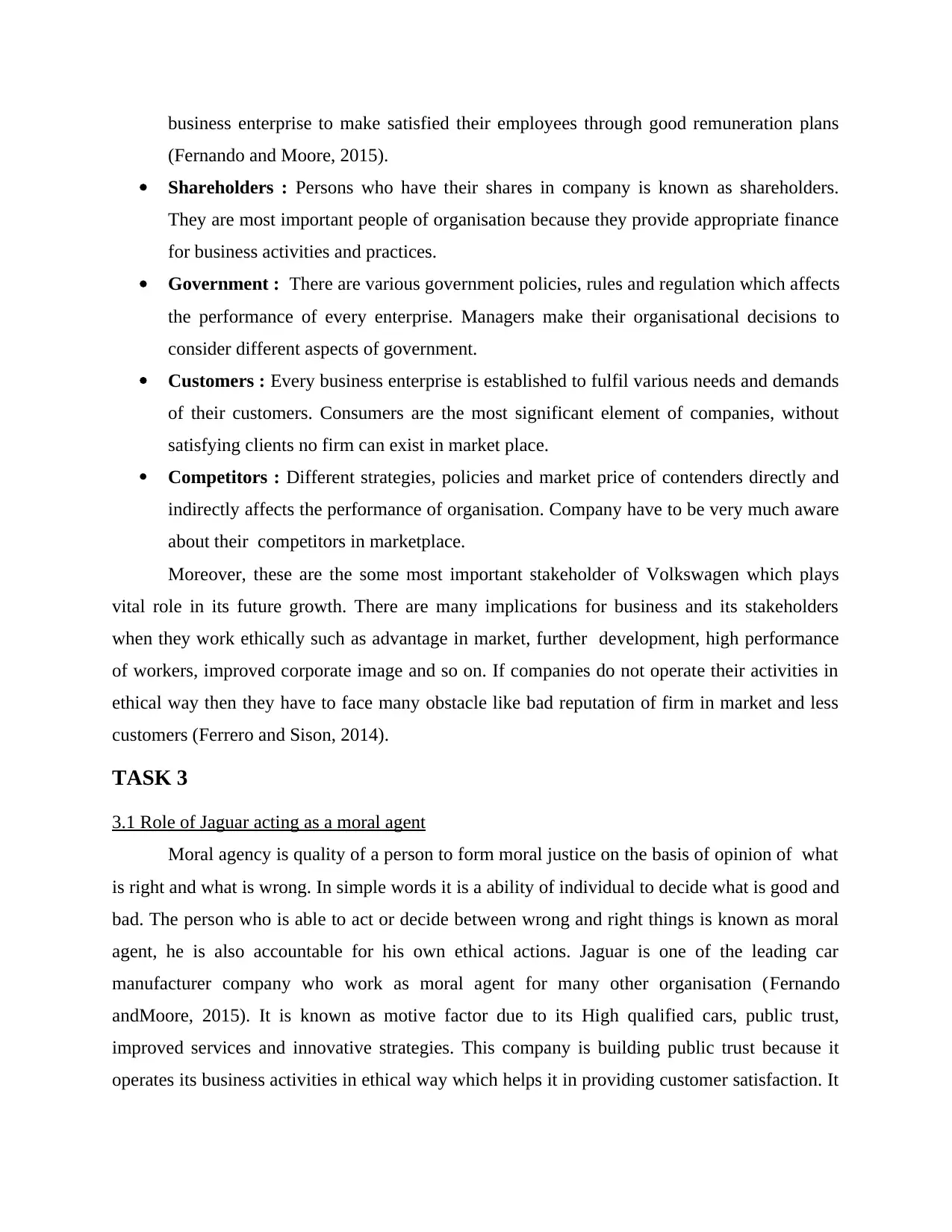
business enterprise to make satisfied their employees through good remuneration plans
(Fernando and Moore, 2015).
Shareholders : Persons who have their shares in company is known as shareholders.
They are most important people of organisation because they provide appropriate finance
for business activities and practices.
Government : There are various government policies, rules and regulation which affects
the performance of every enterprise. Managers make their organisational decisions to
consider different aspects of government.
Customers : Every business enterprise is established to fulfil various needs and demands
of their customers. Consumers are the most significant element of companies, without
satisfying clients no firm can exist in market place.
Competitors : Different strategies, policies and market price of contenders directly and
indirectly affects the performance of organisation. Company have to be very much aware
about their competitors in marketplace.
Moreover, these are the some most important stakeholder of Volkswagen which plays
vital role in its future growth. There are many implications for business and its stakeholders
when they work ethically such as advantage in market, further development, high performance
of workers, improved corporate image and so on. If companies do not operate their activities in
ethical way then they have to face many obstacle like bad reputation of firm in market and less
customers (Ferrero and Sison, 2014).
TASK 3
3.1 Role of Jaguar acting as a moral agent
Moral agency is quality of a person to form moral justice on the basis of opinion of what
is right and what is wrong. In simple words it is a ability of individual to decide what is good and
bad. The person who is able to act or decide between wrong and right things is known as moral
agent, he is also accountable for his own ethical actions. Jaguar is one of the leading car
manufacturer company who work as moral agent for many other organisation (Fernando
andMoore, 2015). It is known as motive factor due to its High qualified cars, public trust,
improved services and innovative strategies. This company is building public trust because it
operates its business activities in ethical way which helps it in providing customer satisfaction. It
(Fernando and Moore, 2015).
Shareholders : Persons who have their shares in company is known as shareholders.
They are most important people of organisation because they provide appropriate finance
for business activities and practices.
Government : There are various government policies, rules and regulation which affects
the performance of every enterprise. Managers make their organisational decisions to
consider different aspects of government.
Customers : Every business enterprise is established to fulfil various needs and demands
of their customers. Consumers are the most significant element of companies, without
satisfying clients no firm can exist in market place.
Competitors : Different strategies, policies and market price of contenders directly and
indirectly affects the performance of organisation. Company have to be very much aware
about their competitors in marketplace.
Moreover, these are the some most important stakeholder of Volkswagen which plays
vital role in its future growth. There are many implications for business and its stakeholders
when they work ethically such as advantage in market, further development, high performance
of workers, improved corporate image and so on. If companies do not operate their activities in
ethical way then they have to face many obstacle like bad reputation of firm in market and less
customers (Ferrero and Sison, 2014).
TASK 3
3.1 Role of Jaguar acting as a moral agent
Moral agency is quality of a person to form moral justice on the basis of opinion of what
is right and what is wrong. In simple words it is a ability of individual to decide what is good and
bad. The person who is able to act or decide between wrong and right things is known as moral
agent, he is also accountable for his own ethical actions. Jaguar is one of the leading car
manufacturer company who work as moral agent for many other organisation (Fernando
andMoore, 2015). It is known as motive factor due to its High qualified cars, public trust,
improved services and innovative strategies. This company is building public trust because it
operates its business activities in ethical way which helps it in providing customer satisfaction. It
Paraphrase This Document
Need a fresh take? Get an instant paraphrase of this document with our AI Paraphraser
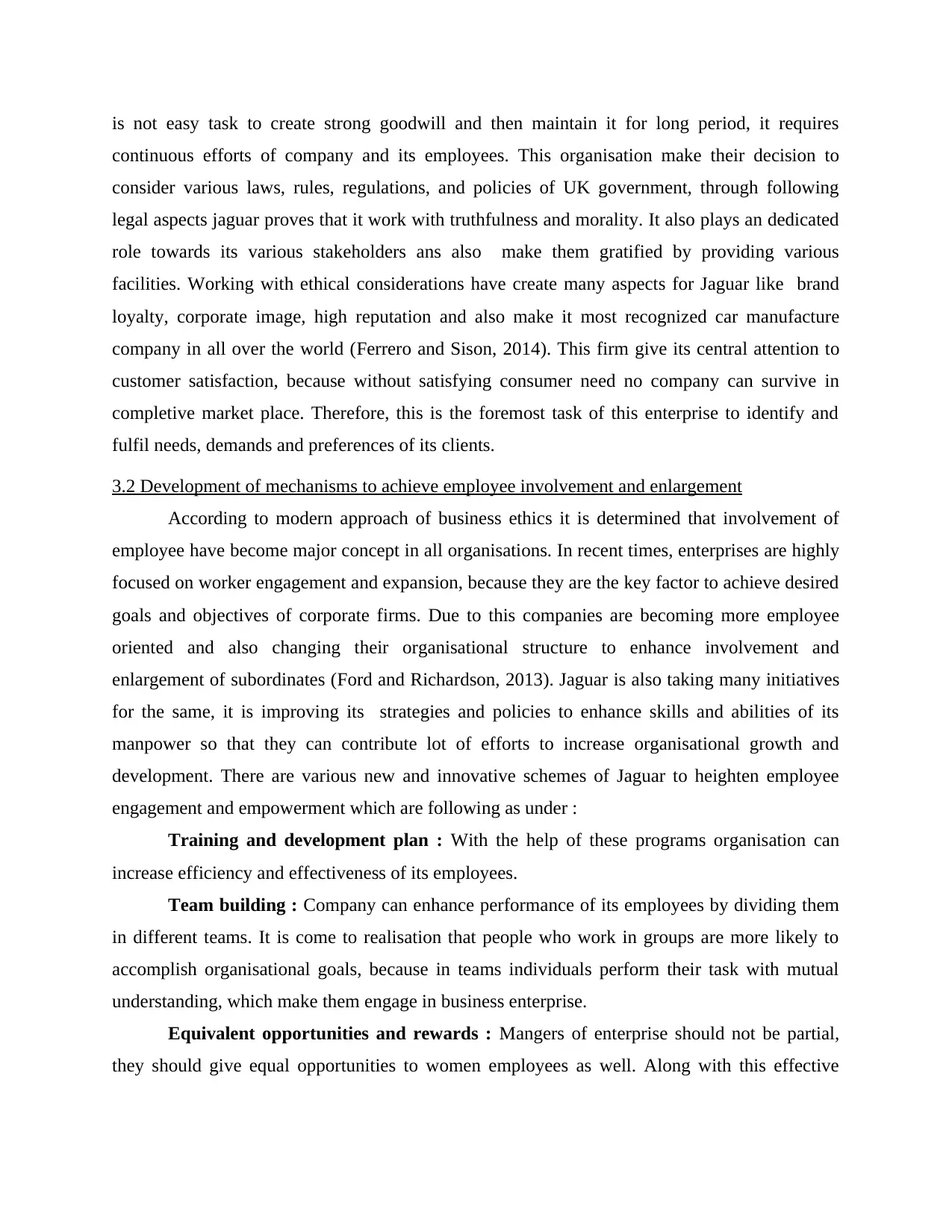
is not easy task to create strong goodwill and then maintain it for long period, it requires
continuous efforts of company and its employees. This organisation make their decision to
consider various laws, rules, regulations, and policies of UK government, through following
legal aspects jaguar proves that it work with truthfulness and morality. It also plays an dedicated
role towards its various stakeholders ans also make them gratified by providing various
facilities. Working with ethical considerations have create many aspects for Jaguar like brand
loyalty, corporate image, high reputation and also make it most recognized car manufacture
company in all over the world (Ferrero and Sison, 2014). This firm give its central attention to
customer satisfaction, because without satisfying consumer need no company can survive in
completive market place. Therefore, this is the foremost task of this enterprise to identify and
fulfil needs, demands and preferences of its clients.
3.2 Development of mechanisms to achieve employee involvement and enlargement
According to modern approach of business ethics it is determined that involvement of
employee have become major concept in all organisations. In recent times, enterprises are highly
focused on worker engagement and expansion, because they are the key factor to achieve desired
goals and objectives of corporate firms. Due to this companies are becoming more employee
oriented and also changing their organisational structure to enhance involvement and
enlargement of subordinates (Ford and Richardson, 2013). Jaguar is also taking many initiatives
for the same, it is improving its strategies and policies to enhance skills and abilities of its
manpower so that they can contribute lot of efforts to increase organisational growth and
development. There are various new and innovative schemes of Jaguar to heighten employee
engagement and empowerment which are following as under :
Training and development plan : With the help of these programs organisation can
increase efficiency and effectiveness of its employees.
Team building : Company can enhance performance of its employees by dividing them
in different teams. It is come to realisation that people who work in groups are more likely to
accomplish organisational goals, because in teams individuals perform their task with mutual
understanding, which make them engage in business enterprise.
Equivalent opportunities and rewards : Mangers of enterprise should not be partial,
they should give equal opportunities to women employees as well. Along with this effective
continuous efforts of company and its employees. This organisation make their decision to
consider various laws, rules, regulations, and policies of UK government, through following
legal aspects jaguar proves that it work with truthfulness and morality. It also plays an dedicated
role towards its various stakeholders ans also make them gratified by providing various
facilities. Working with ethical considerations have create many aspects for Jaguar like brand
loyalty, corporate image, high reputation and also make it most recognized car manufacture
company in all over the world (Ferrero and Sison, 2014). This firm give its central attention to
customer satisfaction, because without satisfying consumer need no company can survive in
completive market place. Therefore, this is the foremost task of this enterprise to identify and
fulfil needs, demands and preferences of its clients.
3.2 Development of mechanisms to achieve employee involvement and enlargement
According to modern approach of business ethics it is determined that involvement of
employee have become major concept in all organisations. In recent times, enterprises are highly
focused on worker engagement and expansion, because they are the key factor to achieve desired
goals and objectives of corporate firms. Due to this companies are becoming more employee
oriented and also changing their organisational structure to enhance involvement and
enlargement of subordinates (Ford and Richardson, 2013). Jaguar is also taking many initiatives
for the same, it is improving its strategies and policies to enhance skills and abilities of its
manpower so that they can contribute lot of efforts to increase organisational growth and
development. There are various new and innovative schemes of Jaguar to heighten employee
engagement and empowerment which are following as under :
Training and development plan : With the help of these programs organisation can
increase efficiency and effectiveness of its employees.
Team building : Company can enhance performance of its employees by dividing them
in different teams. It is come to realisation that people who work in groups are more likely to
accomplish organisational goals, because in teams individuals perform their task with mutual
understanding, which make them engage in business enterprise.
Equivalent opportunities and rewards : Mangers of enterprise should not be partial,
they should give equal opportunities to women employees as well. Along with this effective
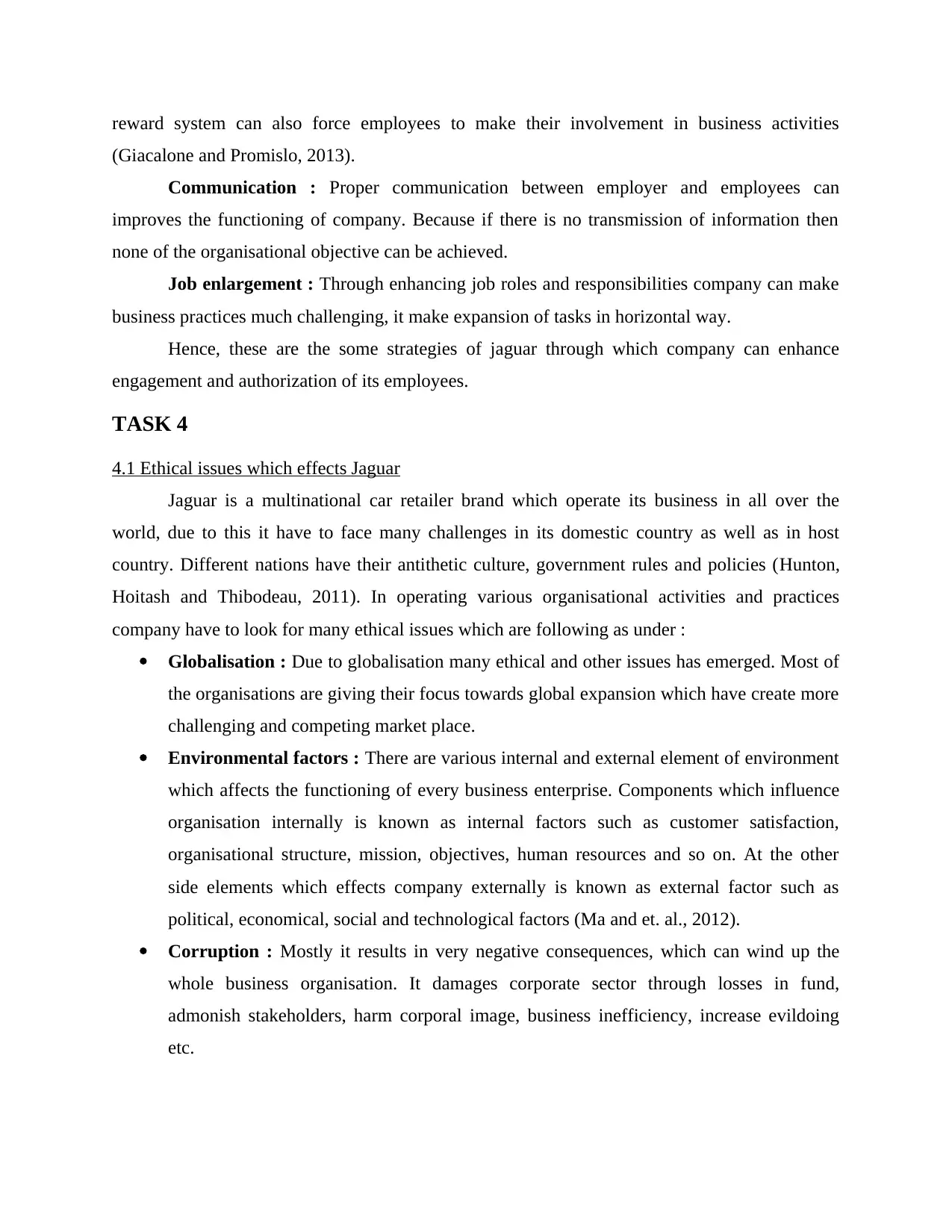
reward system can also force employees to make their involvement in business activities
(Giacalone and Promislo, 2013).
Communication : Proper communication between employer and employees can
improves the functioning of company. Because if there is no transmission of information then
none of the organisational objective can be achieved.
Job enlargement : Through enhancing job roles and responsibilities company can make
business practices much challenging, it make expansion of tasks in horizontal way.
Hence, these are the some strategies of jaguar through which company can enhance
engagement and authorization of its employees.
TASK 4
4.1 Ethical issues which effects Jaguar
Jaguar is a multinational car retailer brand which operate its business in all over the
world, due to this it have to face many challenges in its domestic country as well as in host
country. Different nations have their antithetic culture, government rules and policies (Hunton,
Hoitash and Thibodeau, 2011). In operating various organisational activities and practices
company have to look for many ethical issues which are following as under :
Globalisation : Due to globalisation many ethical and other issues has emerged. Most of
the organisations are giving their focus towards global expansion which have create more
challenging and competing market place.
Environmental factors : There are various internal and external element of environment
which affects the functioning of every business enterprise. Components which influence
organisation internally is known as internal factors such as customer satisfaction,
organisational structure, mission, objectives, human resources and so on. At the other
side elements which effects company externally is known as external factor such as
political, economical, social and technological factors (Ma and et. al., 2012).
Corruption : Mostly it results in very negative consequences, which can wind up the
whole business organisation. It damages corporate sector through losses in fund,
admonish stakeholders, harm corporal image, business inefficiency, increase evildoing
etc.
(Giacalone and Promislo, 2013).
Communication : Proper communication between employer and employees can
improves the functioning of company. Because if there is no transmission of information then
none of the organisational objective can be achieved.
Job enlargement : Through enhancing job roles and responsibilities company can make
business practices much challenging, it make expansion of tasks in horizontal way.
Hence, these are the some strategies of jaguar through which company can enhance
engagement and authorization of its employees.
TASK 4
4.1 Ethical issues which effects Jaguar
Jaguar is a multinational car retailer brand which operate its business in all over the
world, due to this it have to face many challenges in its domestic country as well as in host
country. Different nations have their antithetic culture, government rules and policies (Hunton,
Hoitash and Thibodeau, 2011). In operating various organisational activities and practices
company have to look for many ethical issues which are following as under :
Globalisation : Due to globalisation many ethical and other issues has emerged. Most of
the organisations are giving their focus towards global expansion which have create more
challenging and competing market place.
Environmental factors : There are various internal and external element of environment
which affects the functioning of every business enterprise. Components which influence
organisation internally is known as internal factors such as customer satisfaction,
organisational structure, mission, objectives, human resources and so on. At the other
side elements which effects company externally is known as external factor such as
political, economical, social and technological factors (Ma and et. al., 2012).
Corruption : Mostly it results in very negative consequences, which can wind up the
whole business organisation. It damages corporate sector through losses in fund,
admonish stakeholders, harm corporal image, business inefficiency, increase evildoing
etc.
⊘ This is a preview!⊘
Do you want full access?
Subscribe today to unlock all pages.

Trusted by 1+ million students worldwide
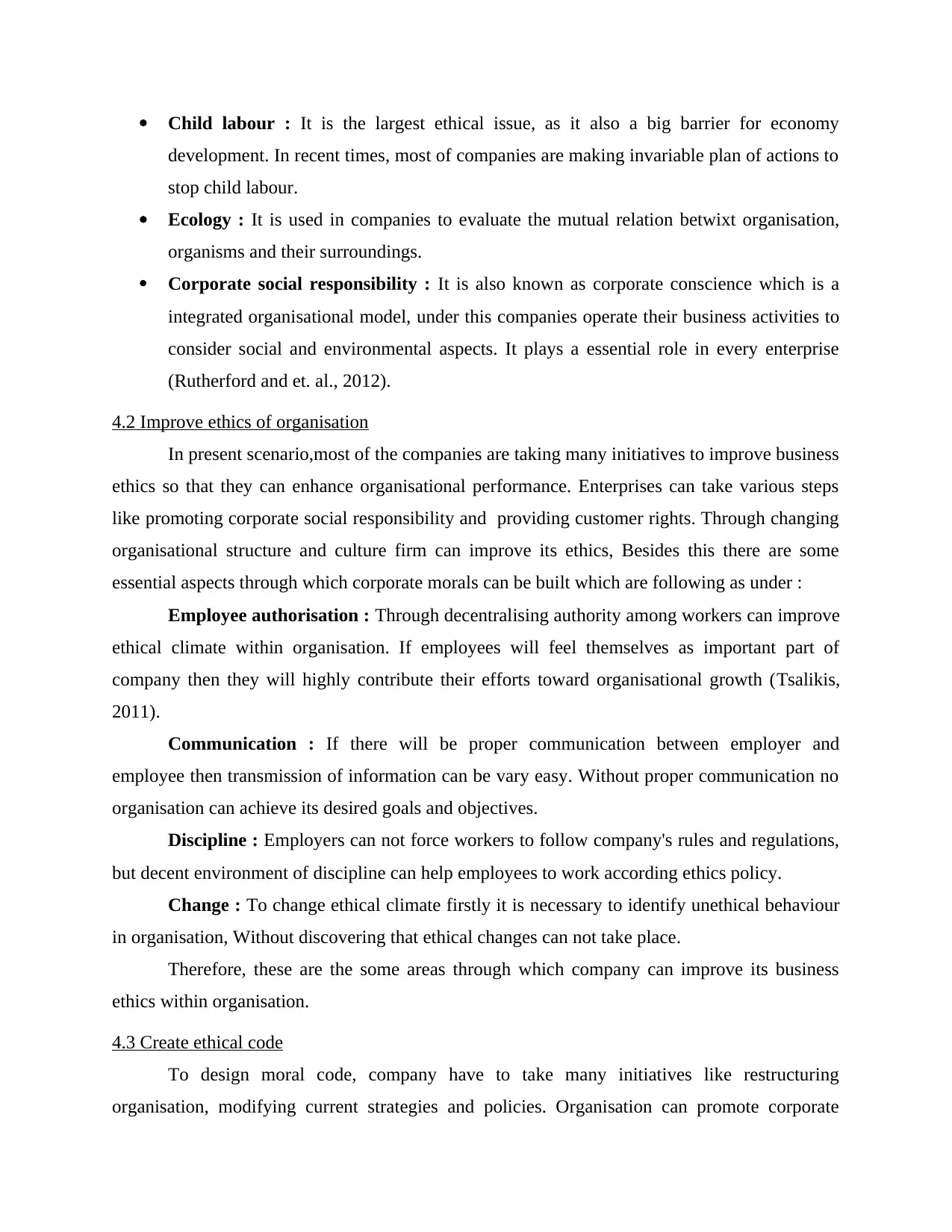
Child labour : It is the largest ethical issue, as it also a big barrier for economy
development. In recent times, most of companies are making invariable plan of actions to
stop child labour.
Ecology : It is used in companies to evaluate the mutual relation betwixt organisation,
organisms and their surroundings.
Corporate social responsibility : It is also known as corporate conscience which is a
integrated organisational model, under this companies operate their business activities to
consider social and environmental aspects. It plays a essential role in every enterprise
(Rutherford and et. al., 2012).
4.2 Improve ethics of organisation
In present scenario,most of the companies are taking many initiatives to improve business
ethics so that they can enhance organisational performance. Enterprises can take various steps
like promoting corporate social responsibility and providing customer rights. Through changing
organisational structure and culture firm can improve its ethics, Besides this there are some
essential aspects through which corporate morals can be built which are following as under :
Employee authorisation : Through decentralising authority among workers can improve
ethical climate within organisation. If employees will feel themselves as important part of
company then they will highly contribute their efforts toward organisational growth (Tsalikis,
2011).
Communication : If there will be proper communication between employer and
employee then transmission of information can be vary easy. Without proper communication no
organisation can achieve its desired goals and objectives.
Discipline : Employers can not force workers to follow company's rules and regulations,
but decent environment of discipline can help employees to work according ethics policy.
Change : To change ethical climate firstly it is necessary to identify unethical behaviour
in organisation, Without discovering that ethical changes can not take place.
Therefore, these are the some areas through which company can improve its business
ethics within organisation.
4.3 Create ethical code
To design moral code, company have to take many initiatives like restructuring
organisation, modifying current strategies and policies. Organisation can promote corporate
development. In recent times, most of companies are making invariable plan of actions to
stop child labour.
Ecology : It is used in companies to evaluate the mutual relation betwixt organisation,
organisms and their surroundings.
Corporate social responsibility : It is also known as corporate conscience which is a
integrated organisational model, under this companies operate their business activities to
consider social and environmental aspects. It plays a essential role in every enterprise
(Rutherford and et. al., 2012).
4.2 Improve ethics of organisation
In present scenario,most of the companies are taking many initiatives to improve business
ethics so that they can enhance organisational performance. Enterprises can take various steps
like promoting corporate social responsibility and providing customer rights. Through changing
organisational structure and culture firm can improve its ethics, Besides this there are some
essential aspects through which corporate morals can be built which are following as under :
Employee authorisation : Through decentralising authority among workers can improve
ethical climate within organisation. If employees will feel themselves as important part of
company then they will highly contribute their efforts toward organisational growth (Tsalikis,
2011).
Communication : If there will be proper communication between employer and
employee then transmission of information can be vary easy. Without proper communication no
organisation can achieve its desired goals and objectives.
Discipline : Employers can not force workers to follow company's rules and regulations,
but decent environment of discipline can help employees to work according ethics policy.
Change : To change ethical climate firstly it is necessary to identify unethical behaviour
in organisation, Without discovering that ethical changes can not take place.
Therefore, these are the some areas through which company can improve its business
ethics within organisation.
4.3 Create ethical code
To design moral code, company have to take many initiatives like restructuring
organisation, modifying current strategies and policies. Organisation can promote corporate
Paraphrase This Document
Need a fresh take? Get an instant paraphrase of this document with our AI Paraphraser
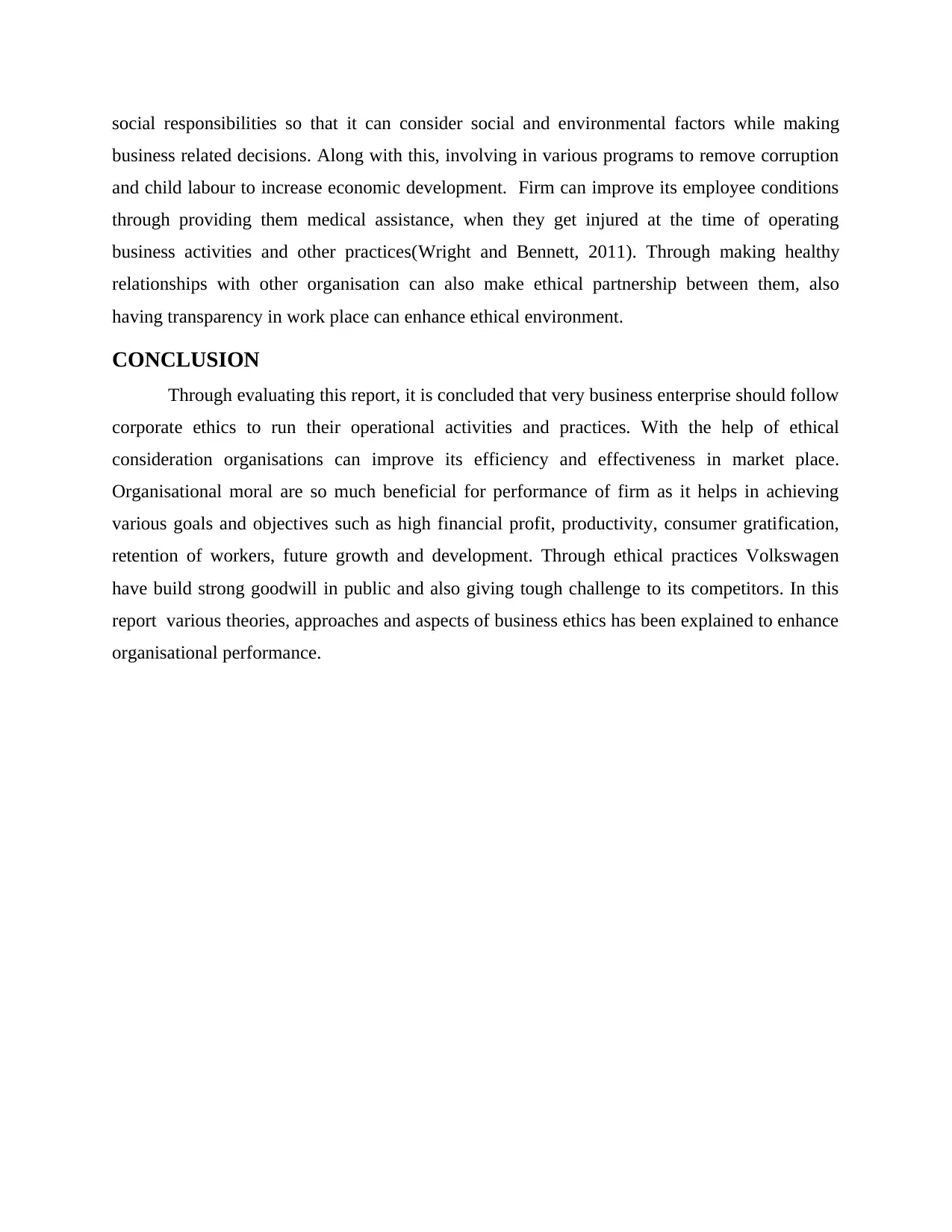
social responsibilities so that it can consider social and environmental factors while making
business related decisions. Along with this, involving in various programs to remove corruption
and child labour to increase economic development. Firm can improve its employee conditions
through providing them medical assistance, when they get injured at the time of operating
business activities and other practices(Wright and Bennett, 2011). Through making healthy
relationships with other organisation can also make ethical partnership between them, also
having transparency in work place can enhance ethical environment.
CONCLUSION
Through evaluating this report, it is concluded that very business enterprise should follow
corporate ethics to run their operational activities and practices. With the help of ethical
consideration organisations can improve its efficiency and effectiveness in market place.
Organisational moral are so much beneficial for performance of firm as it helps in achieving
various goals and objectives such as high financial profit, productivity, consumer gratification,
retention of workers, future growth and development. Through ethical practices Volkswagen
have build strong goodwill in public and also giving tough challenge to its competitors. In this
report various theories, approaches and aspects of business ethics has been explained to enhance
organisational performance.
business related decisions. Along with this, involving in various programs to remove corruption
and child labour to increase economic development. Firm can improve its employee conditions
through providing them medical assistance, when they get injured at the time of operating
business activities and other practices(Wright and Bennett, 2011). Through making healthy
relationships with other organisation can also make ethical partnership between them, also
having transparency in work place can enhance ethical environment.
CONCLUSION
Through evaluating this report, it is concluded that very business enterprise should follow
corporate ethics to run their operational activities and practices. With the help of ethical
consideration organisations can improve its efficiency and effectiveness in market place.
Organisational moral are so much beneficial for performance of firm as it helps in achieving
various goals and objectives such as high financial profit, productivity, consumer gratification,
retention of workers, future growth and development. Through ethical practices Volkswagen
have build strong goodwill in public and also giving tough challenge to its competitors. In this
report various theories, approaches and aspects of business ethics has been explained to enhance
organisational performance.
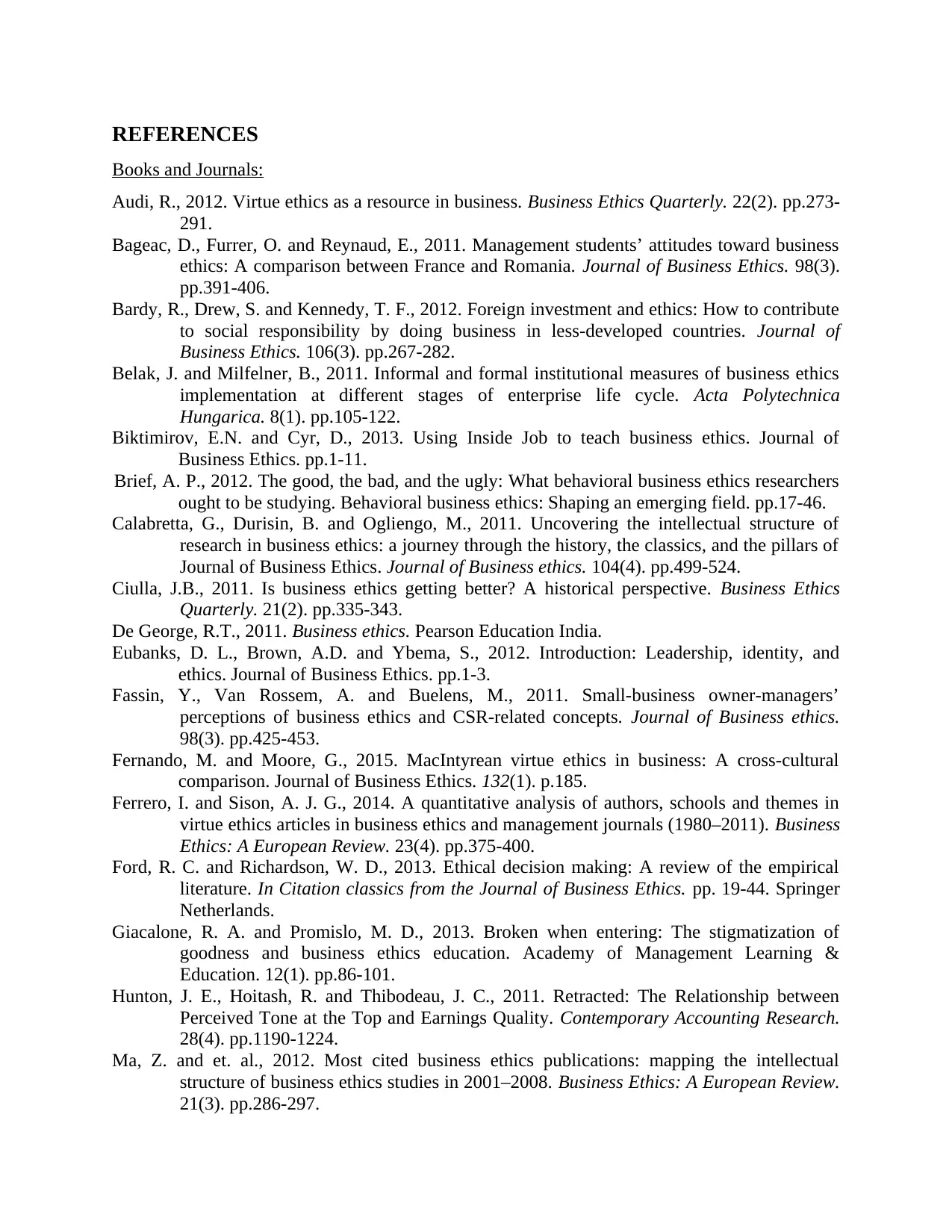
REFERENCES
Books and Journals:
Audi, R., 2012. Virtue ethics as a resource in business. Business Ethics Quarterly. 22(2). pp.273-
291.
Bageac, D., Furrer, O. and Reynaud, E., 2011. Management students’ attitudes toward business
ethics: A comparison between France and Romania. Journal of Business Ethics. 98(3).
pp.391-406.
Bardy, R., Drew, S. and Kennedy, T. F., 2012. Foreign investment and ethics: How to contribute
to social responsibility by doing business in less-developed countries. Journal of
Business Ethics. 106(3). pp.267-282.
Belak, J. and Milfelner, B., 2011. Informal and formal institutional measures of business ethics
implementation at different stages of enterprise life cycle. Acta Polytechnica
Hungarica. 8(1). pp.105-122.
Biktimirov, E.N. and Cyr, D., 2013. Using Inside Job to teach business ethics. Journal of
Business Ethics. pp.1-11.
Brief, A. P., 2012. The good, the bad, and the ugly: What behavioral business ethics researchers
ought to be studying. Behavioral business ethics: Shaping an emerging field. pp.17-46.
Calabretta, G., Durisin, B. and Ogliengo, M., 2011. Uncovering the intellectual structure of
research in business ethics: a journey through the history, the classics, and the pillars of
Journal of Business Ethics. Journal of Business ethics. 104(4). pp.499-524.
Ciulla, J.B., 2011. Is business ethics getting better? A historical perspective. Business Ethics
Quarterly. 21(2). pp.335-343.
De George, R.T., 2011. Business ethics. Pearson Education India.
Eubanks, D. L., Brown, A.D. and Ybema, S., 2012. Introduction: Leadership, identity, and
ethics. Journal of Business Ethics. pp.1-3.
Fassin, Y., Van Rossem, A. and Buelens, M., 2011. Small-business owner-managers’
perceptions of business ethics and CSR-related concepts. Journal of Business ethics.
98(3). pp.425-453.
Fernando, M. and Moore, G., 2015. MacIntyrean virtue ethics in business: A cross-cultural
comparison. Journal of Business Ethics. 132(1). p.185.
Ferrero, I. and Sison, A. J. G., 2014. A quantitative analysis of authors, schools and themes in
virtue ethics articles in business ethics and management journals (1980–2011). Business
Ethics: A European Review. 23(4). pp.375-400.
Ford, R. C. and Richardson, W. D., 2013. Ethical decision making: A review of the empirical
literature. In Citation classics from the Journal of Business Ethics. pp. 19-44. Springer
Netherlands.
Giacalone, R. A. and Promislo, M. D., 2013. Broken when entering: The stigmatization of
goodness and business ethics education. Academy of Management Learning &
Education. 12(1). pp.86-101.
Hunton, J. E., Hoitash, R. and Thibodeau, J. C., 2011. Retracted: The Relationship between
Perceived Tone at the Top and Earnings Quality. Contemporary Accounting Research.
28(4). pp.1190-1224.
Ma, Z. and et. al., 2012. Most cited business ethics publications: mapping the intellectual
structure of business ethics studies in 2001–2008. Business Ethics: A European Review.
21(3). pp.286-297.
Books and Journals:
Audi, R., 2012. Virtue ethics as a resource in business. Business Ethics Quarterly. 22(2). pp.273-
291.
Bageac, D., Furrer, O. and Reynaud, E., 2011. Management students’ attitudes toward business
ethics: A comparison between France and Romania. Journal of Business Ethics. 98(3).
pp.391-406.
Bardy, R., Drew, S. and Kennedy, T. F., 2012. Foreign investment and ethics: How to contribute
to social responsibility by doing business in less-developed countries. Journal of
Business Ethics. 106(3). pp.267-282.
Belak, J. and Milfelner, B., 2011. Informal and formal institutional measures of business ethics
implementation at different stages of enterprise life cycle. Acta Polytechnica
Hungarica. 8(1). pp.105-122.
Biktimirov, E.N. and Cyr, D., 2013. Using Inside Job to teach business ethics. Journal of
Business Ethics. pp.1-11.
Brief, A. P., 2012. The good, the bad, and the ugly: What behavioral business ethics researchers
ought to be studying. Behavioral business ethics: Shaping an emerging field. pp.17-46.
Calabretta, G., Durisin, B. and Ogliengo, M., 2011. Uncovering the intellectual structure of
research in business ethics: a journey through the history, the classics, and the pillars of
Journal of Business Ethics. Journal of Business ethics. 104(4). pp.499-524.
Ciulla, J.B., 2011. Is business ethics getting better? A historical perspective. Business Ethics
Quarterly. 21(2). pp.335-343.
De George, R.T., 2011. Business ethics. Pearson Education India.
Eubanks, D. L., Brown, A.D. and Ybema, S., 2012. Introduction: Leadership, identity, and
ethics. Journal of Business Ethics. pp.1-3.
Fassin, Y., Van Rossem, A. and Buelens, M., 2011. Small-business owner-managers’
perceptions of business ethics and CSR-related concepts. Journal of Business ethics.
98(3). pp.425-453.
Fernando, M. and Moore, G., 2015. MacIntyrean virtue ethics in business: A cross-cultural
comparison. Journal of Business Ethics. 132(1). p.185.
Ferrero, I. and Sison, A. J. G., 2014. A quantitative analysis of authors, schools and themes in
virtue ethics articles in business ethics and management journals (1980–2011). Business
Ethics: A European Review. 23(4). pp.375-400.
Ford, R. C. and Richardson, W. D., 2013. Ethical decision making: A review of the empirical
literature. In Citation classics from the Journal of Business Ethics. pp. 19-44. Springer
Netherlands.
Giacalone, R. A. and Promislo, M. D., 2013. Broken when entering: The stigmatization of
goodness and business ethics education. Academy of Management Learning &
Education. 12(1). pp.86-101.
Hunton, J. E., Hoitash, R. and Thibodeau, J. C., 2011. Retracted: The Relationship between
Perceived Tone at the Top and Earnings Quality. Contemporary Accounting Research.
28(4). pp.1190-1224.
Ma, Z. and et. al., 2012. Most cited business ethics publications: mapping the intellectual
structure of business ethics studies in 2001–2008. Business Ethics: A European Review.
21(3). pp.286-297.
⊘ This is a preview!⊘
Do you want full access?
Subscribe today to unlock all pages.

Trusted by 1+ million students worldwide
1 out of 13
Related Documents
Your All-in-One AI-Powered Toolkit for Academic Success.
+13062052269
info@desklib.com
Available 24*7 on WhatsApp / Email
![[object Object]](/_next/static/media/star-bottom.7253800d.svg)
Unlock your academic potential
Copyright © 2020–2026 A2Z Services. All Rights Reserved. Developed and managed by ZUCOL.





